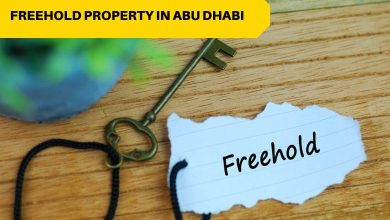Understanding Freehold and Leasehold Properties in the UAE

Discover the difference between freehold and leasehold properties in the UAE and make informed decisions for your real estate investments. The United Arab Emirates (UAE) has become an attractive destination for property investments, offering a wide range of real estate options. When exploring the market, you may come across terms like “freehold” and “leasehold” properties. Understanding the difference between these two property ownership models is crucial for making informed decisions. This article aims to explain the distinctions between freehold and leasehold properties in the UAE.
Freehold Properties
Freehold properties refer to real estate assets that are owned outright by the purchaser. When you buy a freehold property, you gain full ownership rights, including the land and any structures on it, for an indefinite period. This means you have the freedom to use, modify, or sell the property as you wish, subject to relevant laws and regulations. Freehold properties are typically available to both UAE nationals and foreign investors in designated areas.
Leasehold Properties
Leasehold properties, on the other hand, involve a lease agreement between the property owner (landlord) and the tenant (lessee). The lease grants the tenant the right to use and occupy the property for a specific period, which can range from 30 to 99 years, depending on the terms of the lease. Leasehold properties are commonly found in areas where freehold ownership is restricted to UAE nationals, such as certain parts of Abu Dhabi and Dubai.
Ownership Duration
One of the fundamental differences between freehold and leasehold property is the duration of ownership. With freehold property, the owner enjoys indefinite ownership rights. In contrast, leasehold property has a predetermined ownership period specified in the lease agreement, typically ranging from 30 to 99 years.
Property Usage Rights
Freehold property owners have complete freedom to utilize their property as they see fit, subject to applicable laws and regulations. They can occupy, lease, sell, or transfer the property at their discretion. Conversely, leasehold property owners have limited rights and must adhere to the terms and conditions outlined in the lease agreement.
Transfer of Ownership
Transferring ownership of freehold property involves a straightforward process. The owner can sell or transfer the property to another party through a sale deed or contract. However, the transfer of leasehold property ownership is subject to the restrictions and terms stipulated in the lease agreement, often requiring the landowner’s consent.
Maintenance Responsibilities
When it comes to maintenance responsibilities, freehold property owners are solely responsible for the upkeep and maintenance of their property. On the contrary, leasehold property owners may have certain maintenance obligations outlined in the lease agreement, with the landowner or property management company often handling common area maintenance.
Financial Considerations
Financially, freehold properties are typically more expensive than leasehold properties due to the long-term ownership rights they offer. Leasehold properties, with their limited ownership duration, may be comparatively more affordable. However, it’s important to consider the specific location, amenities, and market conditions when assessing the financial aspects of each property type.
Resale and Investment Potential
Freehold properties generally hold better resale and investment potential. The ownership rights and flexibility associated with freehold ownership make these properties more attractive to potential buyers and investors. Leasehold properties, on the other hand, may face limitations in terms of resale value and investment potential due to their finite ownership duration.
Flexibility and Customization
Freehold properties offer greater flexibility and customization options for owners. They have the liberty to modify the property, renovate, or make alterations based on their preferences and requirements. Conversely, leasehold properties may have restrictions on customization, requiring the landowner’s consent for significant modifications.
Affordability and Cost
While freehold properties are generally more expensive, they provide long-term ownership benefits and potential appreciation. Leasehold properties can be more affordable, making them a suitable choice for individuals with a limited budget or those looking for short-term investment opportunities. It’s essential to evaluate your financial capabilities and investment goals when choosing between the two.
Popular Areas for Freehold and Leasehold Properties
In Dubai, specific areas are designated for freehold or leasehold properties. Freehold areas, such as Dubai Marina, Downtown Dubai, Palm Jumeirah, and Emirates Hills, offer a wide range of luxurious properties. Leasehold areas, including Deira and Bur Dubai, primarily consist of older developments and commercial properties. Researching the popular areas within each ownership type will aid you in selecting the right location for your property investment.
Legal Framework and Regulations
Dubai has a well-established legal framework and regulations governing both freehold and leasehold properties. The Real Estate Regulatory Agency (RERA) plays a crucial role in overseeing the real estate market and ensuring compliance with regulations. Understanding the legal aspects and seeking professional advice is essential to navigate the property ownership process smoothly.
Pros and Cons of Freehold and Leasehold Properties
Let’s summarize the advantages and disadvantages of each property type to provide a comprehensive overview:
Freehold Property Pros:
Ownership: One of the significant advantages of freehold property is that the owner has absolute ownership of both the property and the land it is built on. This means the owner has full control and can make any alterations or modifications to the property without seeking permission from a landlord or a governing authority.
Long-term Investment: Freehold property is considered a valuable long-term investment. The owner has the flexibility to hold onto the property for as long as desired and can benefit from potential appreciation in its value over time.
Security and Stability: Owning a freehold property provides a sense of security and stability. The owner doesn’t have to worry about lease agreements or tenancy periods, and there’s no risk of sudden rent increases or eviction notices.
Freedom to Use and Customize: Freehold property owners have the freedom to use and customize the property according to their preferences and needs. They can renovate, remodel, or even rebuild the property without any restrictions imposed by a landlord.
Inheritance: Freehold property can be passed down through generations as an inheritance. This allows owners to create a long-lasting legacy and provide financial security for their family.
Freehold Property Cons:
Higher Initial Cost: Freehold properties generally have a higher initial cost compared to leasehold properties. The higher price may pose challenges for potential buyers with limited financial resources.
Maintenance Responsibility: The responsibility for property maintenance falls entirely on the owner’s shoulders. This includes both routine maintenance and major repairs, which can be costly and time-consuming.
Limited Financing Options: Some financial institutions may have stricter lending criteria for freehold properties, making it harder for buyers to obtain mortgages or loans. This can limit the pool of potential buyers and reduce the liquidity of the property.
Local Regulations: Depending on local regulations, there may be restrictions on certain activities or land use for freehold properties. This can limit the owner’s freedom to use the property as desired and may require obtaining permits or approvals for specific purposes.
Property Taxes and Fees: Freehold property owners are responsible for paying property taxes and other associated fees, such as maintenance fees in gated communities or condominiums. These ongoing costs should be considered in the overall financial planning.
Pros of Leasehold Property:
Lower upfront costs: Leasehold properties typically have lower upfront costs compared to freehold properties. This can make them more affordable for buyers, especially first-time buyers.
Amenities and services: Leasehold properties often come with amenities and services, such as maintenance and landscaping, which are managed by the landlord or management company. This can provide convenience and peace of mind to residents.
Shared costs: In leasehold properties, the costs of maintaining and managing communal areas and facilities are shared among the residents. This can help distribute the financial burden and make it more manageable for individual owners.
Security and maintenance: Leasehold properties are often subject to stricter maintenance and security standards, as the landlord or management company is responsible for the overall upkeep of the building or development. This can ensure that the property is well-maintained and secure.
Community living: Leasehold properties are often part of larger developments or complexes, which can foster a sense of community among residents. This can lead to opportunities for socializing and shared activities.
Cons of Leasehold Property:
Lease length and renewal: Leasehold properties come with a lease agreement that specifies a certain length of time, often ranging from 99 to 999 years. As the lease term decreases over time, the property’s value may be affected, and renewing the lease can involve additional costs and negotiations.
Ground rent and service charges: Leasehold properties typically require payment of ground rent and service charges to the landlord or management company. These costs can vary and increase over time, potentially affecting affordability and overall expenses.
Lack of control: Leasehold property owners have less control over decisions related to the property compared to freehold owners. Major decisions, such as alterations to the property or changes in service charges, may require the landlord’s approval.
Potential for disputes: Disputes can arise between leaseholders and landlords or management companies regarding service charges, maintenance responsibilities, or lease terms. Resolving such disputes can be time-consuming and costly.
Limited flexibility: Leasehold properties may have restrictions on alterations, subletting, or pets, as specified in the lease agreement. This can limit the flexibility and freedom of the property owner.
Read More About Commercial Property for Sale: Tips for Buying Your Ideal Investment
Frequently Asked Questions
Q. Can foreigners own freehold properties in the UAE?
A. Yes, foreigners can own freehold properties in designated areas of the UAE. Each emirate has specific regulations outlining the areas where foreign ownership is permitted.
Q. Are leasehold properties renewable?
A. Leasehold properties have a specified lease term, after which the lease may need to be renewed. The renewal terms and conditions are typically outlined in the lease agreement.
Q. Can leasehold properties be sold?
A. Leasehold properties can be sold, but the remaining lease term will impact the property’s value. Potential buyers will consider the remaining years of the lease before making a purchase decision.
Conclusion:
Understanding the difference between freehold and leasehold properties is essential for navigating the UAE’s real estate market. Freehold properties offer complete ownership rights, while leasehold properties provide temporary usage rights under a lease agreement. Each ownership model has its advantages, and the choice depends on your long-term goals, financial capacity, and preferences. Whether you opt for freehold or leasehold, conducting thorough research, seeking professional advice, and understanding the legal implications will help you make informed decisions when investing in UAE’s real estate sector.




